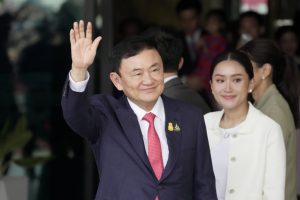Thailand’s justice minister has confirmed that jailed former Prime Minister Thaksin Shinawatra is on a list of 930 elderly inmates approved for parole, increasing the possibility that the popular ex-leader could be freed as early as this weekend.
Tawee Sodsong confirmed that Thaksin’s name was on the list of inmates, who are aged over 70 and have serious health problems, local media outlets reported today.
In August, Thaksin returned to Thailand after years of self-imposed exile, and was taken into custody. However, he was immediately transferred to a police hospital after complaining of chest tightness and high blood pressure, and has remained there ever since. The following month, his sentence was subsequently reduced to one year by a royal pardon, and he will become eligible for parole on February 17.
Special parole can be granted to inmates who are either over 70 or who are suffering from a critical illness or disability after they have served one-third of their sentence. Thaksin is 74, and reportedly suffers from a range of ailments.
However, the rapidity with which the prison sentence of the divisive former PM has been reduced has been the subject of controversy. Complaints have been issued both from royalist conservatives, who spent years waging a political war against Thaksin and his allies, and from progressives, who have complained about unequal treatment for the wealthy former leader.
Minister Tawee’s confirmation came a day after a small group of opponents gathered outside Government House, protesting against parole for the convicted former leader. “Thaksin is only a prisoner in name,” Pichit Chaimongkol, leader of the Students and People’s Network for Thailand Reform, said, according to a Bangkok Post report. “The truth is Thaksin was never in jail and he will receive a special pardon.”
Thaksin served as prime minister from 2001 to 2006, when he was removed from power in a military coup. He was then forced into exile in 2008 after being charged with abuses of power, but has undergone a partial political rehabilitation since Pheu Thai joined hands with a coalition of conservatives to form a government after last May’s general election. The partnership, which emerged after military-appointed senators blocked the progressive Move Forward Party from forming the government, laid the groundwork for the former leader’s return.
Last week, Thaksin’s daughter Paetongtarn, who heads the Pheu Thai Party, said that she did not know whether her father would be among the inmates eligible for parole, The Nation reported. But she said that Ban Chan Song La, the family’s mansion in central Bangkok, had been prepared to welcome Thaksin home should he be paroled on February 18.
Even if he is freed, Thaksin may still face additional legal troubles. Last week, a spokesperson for the Office of the Attorney-General announced that the office is considering prosecuting the former leader on a lese-majeste complaint filed back in 2016. The lese-majeste law, which criminalizes comments deemed critical of the king or the royal family, carries prison sentences of up to 15 years.
Should it happen, as many now expect, Thaksin’s release will no doubt stir up a fresh outrage at various points on the Thai political spectrum, with opponents promising additional protests. In recent months, the political imperative of rehabilitating Thaksin and his party to marginalize the MFP, the new center of democratic energy, has come into tension with both the long-standing political hostilities generated during the nearly two decades of political warfare between Thaksin and the conservative establishment.
In Thai politics, it is not unusual for enmity to translate into alliance as the political landscape changes. But resolving the hostilities generated during that long period of bitter warfare, to say nothing of winding down the various criminal charges and petitions that were initiated during this period, is set to take much longer.
































